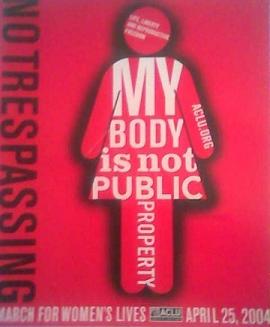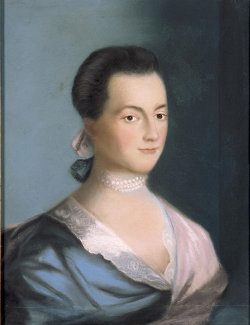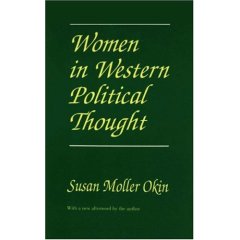Introduction
The current feminist movement has inspired a considerable amount of scholarship in areas previously unexplored. The recent focus on women in the fields of history, legal studies, anthropology, sociology, and literary criticism has resulted in a number of innovative and important works, such that it is no exaggeration to say that these fields will never look the same again. No one, however, has yet examined systematically the treatment of women in the classic works of political philosophy–those works in which great thinkers throughout history have revealed to us their thoughts about the political and social life of the human race. This book is an attempt to reduce the consequent gap in our knowledge.
It is important to realize from the outset that the analysis and criticism of the thoughts of political theorists of the past is not an arcane academic pursuit, but an important means of comprehending and laying bare the assumptions behind deeply rooted modes of thought that continue to affect people’s lives in major ways. Women, in the course of the present century, have officially become citizens in virtually every country of the Western world and in much of the rest of the world as well. From being totally relegated to th private sphere of the household, they have become enfranchised members of the political realm. However, women are increasingly recognizing that the limited, formal, political gains of the earlier feminist movement have in no way ensured the attainment of real equalities in the economic and social aspects of their lives. Though women are now citizens, it is undeniable that they have remained second-class citizens. Measured in terms of characteristics traditionally valued in citizens, such as education, economic independence, or occupational status, they are still far behind men. Likewise, measured in terms of political participation–especially at higher levels–and political power, they are nowhere near the equals of men. In the past decade, moreover, women have been demanding these more substantial equalities, and an end to their relegation to second-class citizenship. They have been claiming the right to be members of society and citizens of the state on an equal level with men, and, in principle at least, their claims have been getting recognition.
The fact that women have gained formal citizenship, but have in no other respect achieved equality with men, has impelled me to turn to the great works of political philosophy, with two major questions in mind. I have asked, first, whether the existing tradition of political philosophy can sustain the inclusion of women in its subject matter, and if not, why not? For if the works which form the basis of our political and philosophical heritage are to continue to be relevant in a world in which the unequal position of women is being radically challenged, we must be able to recognize which of their assumptions and conclusions are inherently connected with the idea that the sexes are, and should be, fundamentally unequal.
Second, and clearly related to the first inquiry, I have aimed to discover whether the philosophers’ arguments about the nature of women and their proper place in the social and political order, viewed in the context of the complete political theories of the philosophers, will help us to understand why the formal, political enfranchisement of women has not led to substantial equality between the sexes. It is not my purpose to argue any causal connection between the arguments and ideas of the great philosophers, on the one hand, and modern ideas or practices, on the other. However, I do argue that modes of thought about women that closely parallel those of some of the philosophers discussed here are still prevalent, in the writings of modern thinkers, and in the ideologies of modern political actors and institutions. This claim is substantiated in Part V, where we turn to analysis of some crucial contemporary views on women–those of influential social scientists and of the highest courts in the U.S.–and discover striking similarities between them and the ideas of the political theorists analyzed in the preceding chapters. By critical study of the arguments about women conceived by some of the finest minds in the history of Western thought, I hope to add to our comprehension of modern arguments which parallel them in important ways, and which constitute a continuing attempt to justify the unequal treatment of women.
It must be recognized at once that the great tradition of political philosophy consists, generally speaking, of writings by men, for men, and about men. While the use of supposedly generic terms like man
and mankind,
and of the allegedly inclusive pronoun he,
might lead one to think that philosophers have intended to refer to the human race as a whole, we do not need to look far into their writings to realize that such an assumption is unfounded. Rousseau, for example, tells his reader at the beginning of the Discourse on the Origins and Foundations of Inequality among Men that It is of man that I am to speak.
It subsequently becomes very clear that it is only the inequality between males that is the subject of his investigation, and the inequality between the sexes is assumed in passing. Past and present feminists, only too aware of such practices, have pointed out the dangerous ambiguity of such linguistic usage in a patriarchal culture. For it enables philosophers to enunciate principles as if they were universally applicable, and then to proceed to exclude all women from their scope.
Even when philosophers have used words which in their respective languages refer unambiguously to any human being, they have felt in no way deterred from excluding women from the conclusions reached. Aristotle, for example, discusses at length what is the highest good for a human being (anthropos). He then proceeds to characterize all women as not only conventionally deprived of, but constitutionally unfitted for, this highest good. Again, Kant uses the most inclusive terms of all for the subjects of his ethical and political theory; he even says that he is not confining his discussion to humans, but that it is applicable to all rational beings.
Subsequently, however, he proceeds to justify a double standard of sexual morality, to the extent that a woman is to be condoned for killing her illegitimate child because of her duty
to uphold, at all costs, her sexual honor.
He also reaches the conclusion that the only characteristic that permanently disqualifies any person from citizenship in the state, and therefore from the obligation to obey only those laws to which consent has been given, is that of being born female. Thus, even words such as person,
human,
and rational being,
apparently, do not necessarily include women.
This phenomenon, made possible by the ambiguity of our language, is not confined to political philosophy. The grand statements of our political culture, too, such as the Declaration of Independence and the Constitution, are phrased in universal terms, but, as the chapter on women and the law will make clear, they have frequently been interpreted in such a way as to exclude women. Thus when the Founding Fathers declared it to be a self-evident truth that all men are created equal,
not only did they intend the substantial slave population to be excluded from the scope of their statement, but they would have been amused and skeptical (as indeed John Adams was to his wife’s appeal that they not forget the ladies) at the suggestion that women were, and should be considered, equal too. Similarly, though the Constitution is phrased in terms of persons,
there was clearly no idea in its framers’ minds that this word might be interpreted so as to include women on the same terms as men.
Human nature,
we realize, as described and discovered by philosophers such as Aristotle, Aquinas, Machiavelli, Locke, Rousseau, Hegel, and many others, is intended to refer only to male human nature. Consequently all the rights and needs that they have considered humanness to entail have not been perceived as applicable to the female half of the human race. Thus there has been, and continues to be, within the traditions of political philosophy and political culture, a pervasive tendency to make allegedly general statements as if the human race were not divided into two sexes, and then either to ignore the female sex altogether, or to proceed to discuss it in terms not at all consistent with the assertions that have been made about man
and humanity.
In spite of this general neglect of women, however, several of the most important and most interesting of political philosophers have had a considerable amount to say about them. The first four parts of this book comprise an analysis of the arguments of Plato, Aristotle, Rousseau, and Mill, on the subject of women, their nature, their socialization and education, and their proper role and station in society. It would be fruitless, if not impossible, to treat such a subject in a vacuum. What I have done, therefore, is to analyze these philosophers’ ideas about women in the context of their entire theories of politics and society, and with particular reference to each philosopher’s conception of the role of the family. Throughout the study, I have examined the various ideas about women and the arguments which sustain them, with a concern both for their internal logic and for their consistency with each philosopher’s argument and conclusions about men, and about politics and society as a whole.
Clearly, in choosing four philosophers I do not pretend to have covered the treatment of women within the entire tradition of political philosophy. Apart from the omission of the socialists, which requires explanation, however, I have chosen those four who of all political theorists have made the most substantial, most interesting, and most thought-provoking contributions on the subject.
The problem regarding Marx, the Marxists, and other socialists, is that, taken together, they had so much to say, and such insight to offer, on the subject of women in society, that their ideas warrant a separate study. It was the utopian, Charles Fourier, who first both used the status of women in a society as the fundamental measuring stick of its advancement, and considered the progress of women toward liberty to be a fundamental cause of general social progress. Other events influence these political changes
; he asserts, but there is no cause which produces social progress or decline as rapidly as a change in the condition of women…. The extension of the privileges of women is the fundamental cause of all social progress.
Fourier’s initiatives were not ignored by subsequent feminists and/or socialists, including Flora Tristan, Marx and John Stuart Mill. Marx developed the idea of the relationship between the equality of women and general social progress, in the 1844 Manuscripts:
The relation of man to woman is the most natural relation of human being to human being. It
indicates, therefore, how far man’s natural behavior has become human, and how far his
human essence has become a natural essence for him, how far his human nature has
become nature for him…. From this relationship man’s whole level of development can be
assessed.
Though Marx himself did not develop this as a major theme in his works, Engels, Bebel, and the critical theorists of the Frankfurt School have developed further the socialist criticism of woman’s position in society, and of the traditional family.
Socialist writings on women require separate study because of two features which are characteristic of, though not unique to, socialist modes of thought. First, socialist theorists have been far less inclined than most other political theorists to regard the family as a necessary and fixed human institution, and have been very much aware of the relationship between various forms of family organization and different forms of economic structure, particularly property relations. This has meant that most, though not all, socialists who have written about women have taken a critical and questioning view of woman’s role within the family, rather than accepting it as a given. Second, socialist thought is noticeably lacking in the tendency to idealize nature
and the natural,
and is inclined to replace these criteria for social excellence by the specifically human
and cultural.
It is largely because of the importance of both these modes of thought for the subject of women, that the contribution of the socialists to the subject is so considerable. The study of that contribution is a task I hope to undertake, and for which the present work constitutes an essential foundation.
From my analysis of the arguments and conclusions of Plato, Aristotle, Rousseau and Mill, concerning women and their proper social and political role, two interconnected themes emerge. First, the most important factor influencing the philosophers’ conceptions of, and arguments about, women has been the view that each of them held concerning the family. Those who have regarded the family as a natural and necessary institution have defined women by their sexual, procreative, and child-rearing functions within it. This has lead to the prescription of a code of morality and conception of rights for women distinctly different from those that have been prescribed for men. The assumption of the necessity of the family leads the theorists to then regard the biological differences between the sexes as entailing all the other, conventional and institutional differences in sex role which the family, especially in its most patriarchal forms, has required.
Second, as a consequence of the above, the constricted role in which woman has been placed has been regarded as dictated by her very nature. Thus, where philosophers have explicitly discussed women, they have frequently not extended to them their various conceptions of human nature.
They have not only assigned women a distinct role, but have defined them separately, and often contrastingly, to men. They have sought for the nature of women not, as for the nature of men, by attempting to separate out nature from the effects of nurture, and to discover what innate potential exists beneath the overlay which results from socialization and other environmental factors. The nature of women, instead, has been seen to be dictated by whatever social and economic structure the philosophers favor and to be defined as whatever best suits their prescribed functions in that society. Philosophers who, in laying the foundation for their political theories, have asked What are men like?
What is man’s potential?
have frequently, in turning to the female sex, asked What are women for?
There is, then, an undeniable connection between assigned female nature
and social structure, and a functionalist attitude to women pervades the history of political thought.
The conclusions drawn here are, first, that women cannot simply be added to the subject matter of existing political theory, for the works of our philosophical heritage are to a very great extent built on the assumption of the inequality of the sexes. In the case of theorists for whom equality, in some form or other, is an important value, the unequal treatment of women tends to be concealed by the adoption of the male-headed family, rather than the individual adult, as the primary unit of political analysis. Indeed, the thoroughly equal treatment of women, involving far more than the right to vote, requires the rethinking of some of the most basic assumptions of political philosophy–having to do with the family and woman’s traditionally dependent and subordinate role within it.
Second, as we examine some twentieth-century perceptions of women and analyze legal discrimination against women, it becomes clear that these findings should be of interest not only to historians or students of political theory. The functionalist treatment of women–the prescriptive view of woman’s nature and proper mode of life based on her role and functions in a patriarchal family structure–is still alive and influential today. Giant figures in modern sociology and psychology present arguments about women that parallel those of Aristotle and Rousseau. Moreover, when we examine the opinions handed down by the highest courts of the land in cases involving sex discrimination, we find, here too, that judges have used functionalist reasoning of a strikingly Aristotelian character in order to justify their treatment of women as a class apart. Thus, there is no doubt that a thorough understanding of this mode of argument can help us to see why women, in spite of their political enfranchisement, are still second-class citizens.
The chapters that follow require one more word of explanation. Obviously, there are many types of inequality both in the real world and in political theory. Only one type of inequality is dealt with here–the unequal treatment of women. As will become evident, the positions taken by political theorists about other types of equality and inequality are by no means necessarily parallel to, or even consistent with, their views about the equal or unequal treatment of the sexes. Those who have argued that there should be complete or virtual equality between the sexes have sometimes been distinctly inegalitarian in other respects; on the other hand, some philosophers who have made strong arguments for equality amongst women have been just as strongly opposed to equality for women. I have not undertaken to discuss this except insofar as a philosopher’s more general egalitarianism or inegalitarianism affects his arguments about distinctions betwen the sexes, or clarifies the presentation of these arguments. This is not because I consider other types of inequality unimportant. It is, rather, because the unequal treatment of women has remained for too long shamefully neglected by students of political thought. Other types of inequality–class inequality in particular, but also inequalities based on race, religion, caste, or ethnicity, have not been so consistently ignored.
In one sense, this book might be compared with the play Rosencrantz and Guildenstern are Dead. In that play, building on the foundation of Hamlet, Tom Stoppard emphasizes this originally elusive pair, and makes them, instead of the traditional hero, into the principal focus of the drama. As a result, the play, all its characters, and their relations to each other take on an entirely new perspective. Similarly, when women, who have always been minor characters in the social and political theory of a patriarchal world, are transformed into major ones, the entire cast and the play in which it is acting look very different.
— Susan Moller Okin, Women in Western Political Thought (Princeton University Press, 1979). 3–12.
Have women been shoved to the margins of political philosophy? Have male political philosophers reduced women’s nature and status to their perceived functions within the family? Are political philosophers stances on social equality between men and women so often inconsistent with, or simply determined independently of, their express views on egalitarianism as a general principle? What else from Okin’s work might help illuminate the points she touches on here? Discuss.



